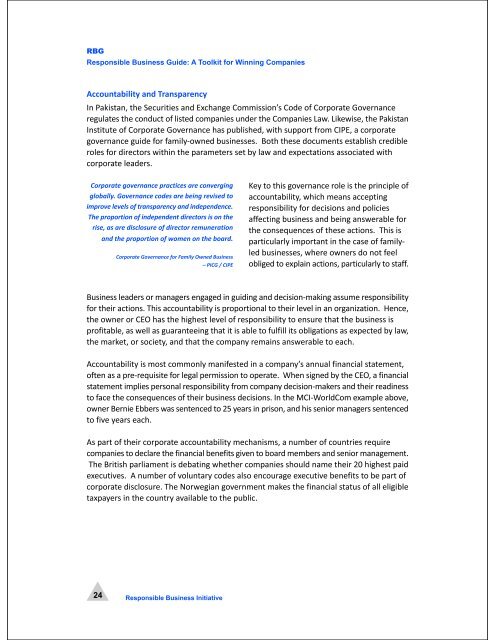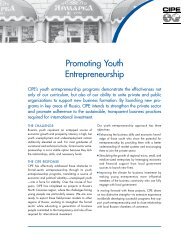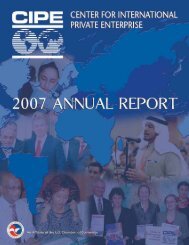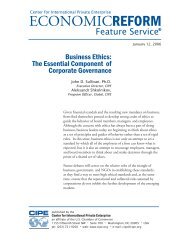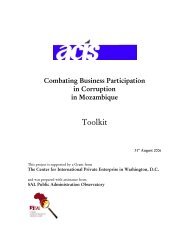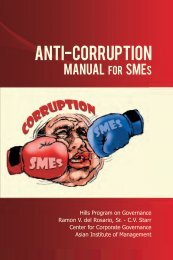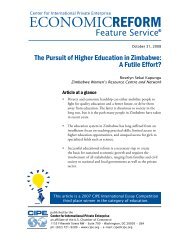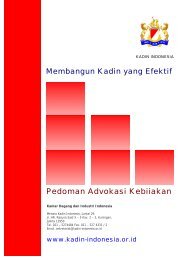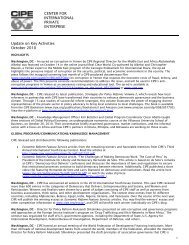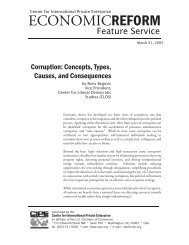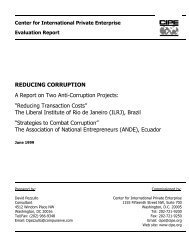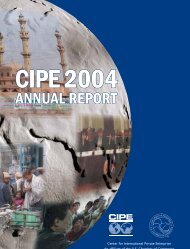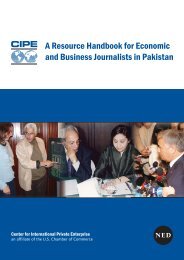Responsible Business Guide: A Toolkit for Winning Companies
Responsible Business Guide: A Toolkit for Winning Companies
Responsible Business Guide: A Toolkit for Winning Companies
Create successful ePaper yourself
Turn your PDF publications into a flip-book with our unique Google optimized e-Paper software.
RBG<br />
<strong>Responsible</strong> <strong>Business</strong> <strong>Guide</strong>: A <strong>Toolkit</strong> <strong>for</strong> <strong>Winning</strong> <strong>Companies</strong><br />
Accountability and Transparency<br />
In Pakistan, the Securities and Exchange Commission’s Code of Corporate Governance<br />
regulates the conduct of listed companies under the <strong>Companies</strong> Law. Likewise, the Pakistan<br />
Institute of Corporate Governance has published, with support from CIPE, a corporate<br />
governance guide <strong>for</strong> family-owned businesses. Both these documents establish credible<br />
roles <strong>for</strong> directors within the parameters set by law and expectations associated with<br />
corporate leaders.<br />
Corporate governance practices are converging<br />
globally. Governance codes are being revised to<br />
improve levels of transparency and independence.<br />
The proportion of independent directors is on the<br />
rise, as are disclosure of director remuneration<br />
and the proportion of women on the board.<br />
Corporate Governance <strong>for</strong> Family Owned <strong>Business</strong><br />
– PICG / CIPE<br />
Key to this governance role is the principle of<br />
accountability, which means accepting<br />
responsibility <strong>for</strong> decisions and policies<br />
affecting business and being answerable <strong>for</strong><br />
the consequences of these actions. This is<br />
particularly important in the case of familyled<br />
businesses, where owners do not feel<br />
obliged to explain actions, particularly to staff.<br />
<strong>Business</strong> leaders or managers engaged in guiding and decision-making assume responsibility<br />
<strong>for</strong> their actions. This accountability is proportional to their level in an organization. Hence,<br />
the owner or CEO has the highest level of responsibility to ensure that the business is<br />
profitable, as well as guaranteeing that it is able to fulfill its obligations as expected by law,<br />
the market, or society, and that the company remains answerable to each.<br />
Accountability is most commonly manifested in a company’s annual financial statement,<br />
often as a pre-requisite <strong>for</strong> legal permission to operate. When signed by the CEO, a financial<br />
statement implies personal responsibility from company decision-makers and their readiness<br />
to face the consequences of their business decisions. In the MCI-WorldCom example above,<br />
owner Bernie Ebbers was sentenced to 25 years in prison, and his senior managers sentenced<br />
to five years each.<br />
As part of their corporate accountability mechanisms, a number of countries require<br />
companies to declare the financial benefits given to board members and senior management.<br />
The British parliament is debating whether companies should name their 20 highest paid<br />
executives. A number of voluntary codes also encourage executive benefits to be part of<br />
corporate disclosure. The Norwegian government makes the financial status of all eligible<br />
taxpayers in the country available to the public.<br />
24<br />
<strong>Responsible</strong> <strong>Business</strong> Initiative


